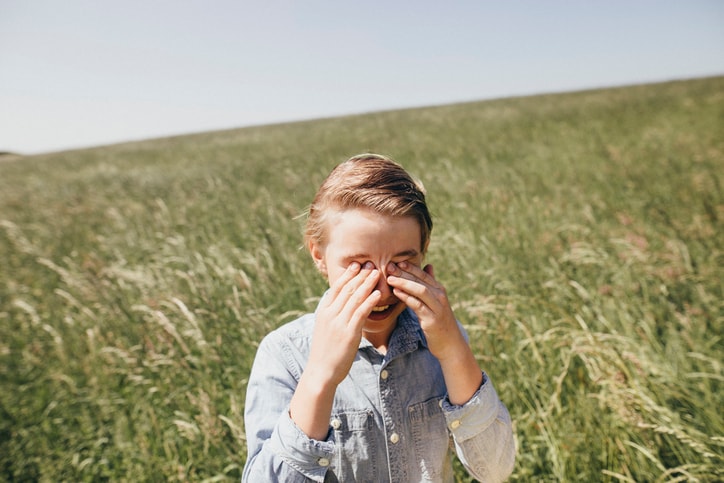>> Are you searching for childcare? Find carers in your area now.
At this time of the year parents everywhere are struggling to prevent the swollen eyes and itchy throats that accompanies their children’s seasonal allergies. With seasonal allergies affecting one in every five adults and children, it is important to take steps to relieve the suffering during the pesky pollen season.
Seasonal allergies, or hay fever, are usually caused when pollen is released into the air by trees, grasses and weeds, and when moulds release their spores. The symptoms can include:
- Sneezing
- Itchy nose
- Itchy throat
- Blocked nose
- Runny nose (clear)
- Coughing
- Triggering of asthma
With these symptoms, it can sometimes be difficult for parents to tell the difference between a cold and allergies. If the symptoms develop in your child at the same time every year, then they are probably caused by seasonal allergies. Furthermore, the symptoms will only last as long as your child is exposed to the allergen. Another way to tell the difference is if there is a fever. Children with allergies won’t suffer from fever as they would with a cold.
What to do when symptoms show up
Talk to your doctor if you think your child has allergies. Your doctor will likely be able to diagnose your child based on their symptoms and a physical exam. If they are unable to diagnose allergies, they may recommend your child go for blood and skin tests which will identify the allergens that affect your child.
Treatment
Ask your doctor for treatment options available for your child. Treatment and medications for allergies usually include:
- Antihistamines
- Decongestants
- Nasal spray
- Eye drops
Most allergy medications are available over the counter and work best when they are taken consistently during the season and not only when symptoms strike. There are also some natural remedies that can help alleviate the suffering of seasonal allergies. Grape juice, nasal washes and local honey are some methods used. However, children should never take unpasteurised honey and children under one years of age should not eat honey at all. Talk to your doctor before administering any natural remedies.
Prevention
There are a number of measures parents can take to help prevent the onslaught of seasonal allergy symptoms:
1. Keep windows closed
Unfortunately, when we open the windows to let the fresh spring air breeze through our homes, the pollen comes along with it. If your child is suffering from seasonal allergies, it is best to keep the windows closed to avoid allergens coming into your home.
2. Wash in the evening
If your kids have been out and about during the day, they likely have pollen on their clothes and body. The child with the allergy should always wash their hands and face when they come inside and change their clothes. If their symptoms aren’t improved, everyone in the household should follow suit. Your child with the allergies should also have a bath or shower before bedtime so they don’t bring pollen into their bed.
3. Check pollen counts
While parents want their kids to be outside and playing in the fresh air and warm weather, it’s not a bad idea to check the pollen count before sending them out. There are many apps these days that check the pollen count, so if it is particularly high on a certain day, it might be a good idea to keep your child occupied with indoor activities.
Tips for nannies and babysitters
If you have a nanny or babysitter, make sure they are kept up-to-date on all of your child’s allergies and treatments. Tell them what signs they should look for. For example, if your child is having difficulty breathing, is wheezing or has a prolonged cough, these may be symptoms of something else, such as asthma. If these symptoms occur, your childminder should tell your child to go inside and take a rest. Contact your doctor if the symptoms persist or happen regularly.
Immediate medical attention will be required if your child exhibits symptoms such as swelling anywhere on their face or tongue or tightening of the throat, as they are experiencing a severe allergic reaction.
>> Are you searching for childcare? Find carers in your area now.
* This article is for general informational purposes only. It is not intended nor implied to be providing medical advice and is not a substitute for such advice. The reader should always consult a health care provider concerning any medical condition or treatment plan. Neither Care.com nor the author assumes any responsibility or liability with respect to the use of any information contained herein.
